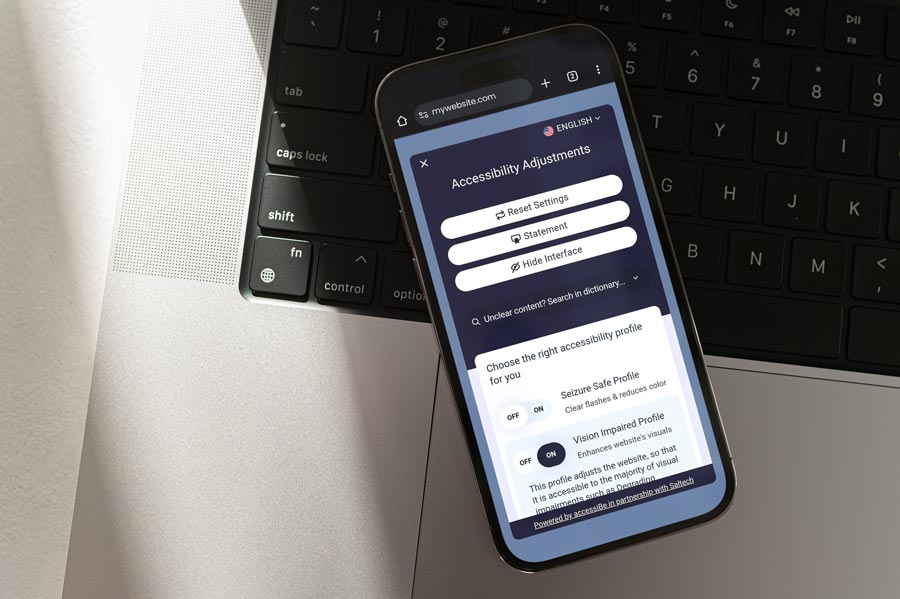Saltech Systems has teamed up with accessiBe, the trusted choice of industry leaders, to bring you accessWidget—an AI solution simplifying website accessibility compliance.
Web accessibility refers to making websites usable for people with disabilities. It involves designing and developing websites in a way that individuals with disabilities, such as those with visual, auditory, motor, and cognitive impairments, can perceive, understand, navigate, and interact with the website and its content.
Web accessibility ensures that everyone has equal access to information, regardless of their abilities. This includes individuals who use assistive technologies, such as screen readers, to access the web.
25% of the US population, and 15% of the worlds population lives with a disability. ADA-compliant web design will bring your website to new audiences and grow your business! Other benefits include:
Consumers are often loyal to companies that prioritize inclusivity. An accessible website ensures a welcoming experience for everyone, enhancing your reputation with both individuals with disabilities and the wider audience.
82% of users will spend more time on an accessible website because it provides a better user experience. This increased time spent on your site can lead to higher conversion rates and improved metrics.
ADA-compliant web design helps mitigate the risk of potential accessibility lawsuits.
Ensuring website accessibility can be a complex task that demands a significant investment of time and resources. Our new AI technology makes the process effortless and much more affordable.
An accessible website is not only more readable for users with disabilities but also for search engines scanning your website, leading to improved SEO performance.
Implementing website accessibility may make your business eligible for the ADA Tax Credit, saving you money on accessWidget and other accessibility updates for your business.
Creating an accessible website is not only the right thing to do and beneficial for your company, but it is also a legal requirement under the Americans with Disabilities Act (ADA).
All public-facing organizations are required to comply with ADA and WCAG standards. Additionally, government entities, government-funded organizations, and those operating in specific states, or internationally may be subject to further regulations.
All organizations that serve the public must comply with ADA regulations.
The ADA (Americans with Disabilities Act, 1990) protects the civil rights of people with disabilities in many aspects of public life. In 2022 the Department of Justice confirmed that websites are places of public accommodation and are subject to the ADA’s requirements of general non-discrimination and effective communication.
WCAG (Web Content Accessibility Guidelines) is a guide on how websites should look and operate for people with disabilities. The WCAG has been widely accepted as the industry standard for being ADA-compliant. By abiding with WCAG guidelines, your website will be considered compliant.
Any government entity or government-funded organization must comply with additional Section 508 regulations.
Any government entity or government-funded organization must build and maintain all information and communication technology so that they are accessible to people with disabilities.
If a business works with a government agency, it must comply with section 508 guidelines.
As of November 2023, certain regions have established their own set of accessibility laws: NYHRA (New York), UNRUH (California). International regions may also have their own regulations.
These laws apply if your business is physically located in those these regions, and/or if your organization targets customers who live in those regions.

Powered by accessiBe in partnership with Saltech Sytems.
Full Price: $490/year or $59/month
Our website accessibility widget, accessWidget from accessiBe, uses AI-powered technology to scan, remediate, and ensure that your website is compliant 24/7. In addition, the on-screen widget allows users to customize your website to fit their individual visual requirements.
Our accessWidget service stands as a leading AI-powered web accessibility solution, aiming to enhance WCAG and ADA compliance. This widget employs two applications working seamlessly together to strive for consistent alignment with accessibility regulations. The accessibility front-end handles UI and design-related elements, while behind the scenes, AI manages more intricate requirements such as screen reader optimization and keyboard navigation.
An “Accessibility Statement & Certificate” is built into the widget and sent by email as a PDF after the initial 48 hours remediation period. This statement indicates the compliance status of your website and the adjustments that have been made to your website to make it accessible.
accessWidget utilizes AI to scan and analyze the content and structure of your website. It then implements any code adjustments that are needed to reflect the content and structure in a format that works best for screen readers and for keyboard navigation.
The accessibility interface enables users to customize the UI and design of your website to suit their individual needs. This ensures that your website is usable for all users according to their preferences, without requiring any compromise to your brand or design.
Our widget scans your website daily to check the compliance status of your site. It will automatically make any adjustments as needed to ensure that your website remains compliant with the most recent accessibility standards and regulations.
Once a month, accessWidget will run an accessibility compliance audit on your website and send a report to confirm the compliance status of your website.
The advanced plan is for websites with up to 30,000 visits per month or websites that need more advanced accessibility support. This plan includes all of the above, plus:

Discover valuable insights, expert tips, and in-depth information about website accessibility services for your business through our blog.
How Website Accessibility Services Can Help Your Business Grow Investing in website accessibility services is more than just ticking a...
10 Essential Website Accessibility Requirements for Small Business Success Website accessibility requirements are no longer optional—they’re legally required and essential...
Website Accessibility: Why It Matters and How to Achieve It Website accessibility refers to how easily a website can be...
AccessiBe is revolutionizing website accessibility, and Saltech Systems is proud to partner with this industry-leading company. Together, we now offer...
Contact us to get a free website audit or to get started with your 7 day free trial of our accessibility widget.